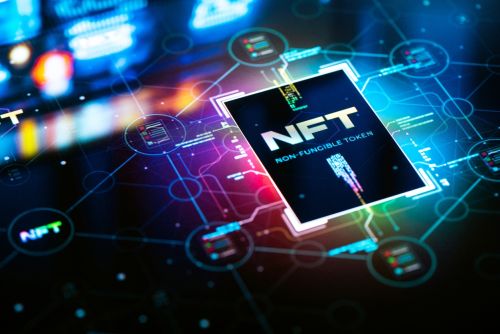Nonfungible tokens — also referred to as “NFTs” — have recently taken the intellectual property world by storm. While an NFT’s value and strength comes from its authenticity, they have dramatically changed the market for digital assets. Previously, there was no viable way to separate the owner of a digital piece of art from someone who merely downloaded a copy to their computer. By acting as a type of digital deed on the blockchain ledger, NFTs solve the problem of verifying ownership and establishing property rights. However, when these digital assets are part of a series, they can also be trademarked to help protect the uniqueness of the digital property.
What are NFTs?
An NFT is a digital asset that is stored on the blockchain. The blockchain is a secure public record that is most commonly known for tracking cryptocurrency transactions. But unlike with bitcoin and other cryptocurrencies, each NFT is unique and cannot be exchanged for another. When an NFT is “minted,” a smart contract code is written and becomes part of the blockchain. Once the NFT becomes part of the blockchain, it cannot be edited.
NFTs can be minted for assets that are both tangible and intangible. While they exist only in digital format, NFTs are not interchangeable and can only have one owner at a time. Due to their scarceness, collectability, and authenticity, NFTs are comparable to fine art — this is why they are so valuable and in such high demand.
NFT Intellectual Property Rights
There are several intellectual property implications that should be considered before trademarking an NFT. Since NFTs have unique aspects that are not inherent in traditional goods or services, special issues must be addressed regarding the licensing, assigning, and transferring of intellectual property rights. In addition to securing trademark protection for the NFT series itself, the creator must also be aware of any potential infringement issues that can arise as a result of using a third-party’s intellectual property.
Additionally, it is crucial to draw a distinction between ownership of the NFT and the ownership of the intellectual property. In other words, just because someone owns an NFT does not mean they have acquired the trademark (and/or copyright) rights associated with it. The rights that are granted by the creator of the NFT can vary with each one. Typically, the intellectual property rights will only be transferred with the NFT if there is an express agreement.
How to Trademark NFTs
Regardless of being a new type of technology, the same trademark laws apply for NFTs as for traditional goods and services. This means first conducting a comprehensive trademark clearance search to make sure the mark representing your NFT is not currently in use. Once you’ve confirmed that the mark is free for your exclusive use, it’s critical to begin the registration process as soon as possible. Although the USPTO generally requires that a mark be used in commerce before it can be registered, you can file an “Intent to Use” application which serves as a placeholder until the mark is actually in use.
Significantly, when filing your trademark application, you must ensure that you select the proper class for your mark. Choosing the correct class is not always as easy as it may sound. For instance, International Class 009 covers fungible and non-fungible token-based goods online, International Class 035 would cover business services in connection with the NFTs. There are also several other classes to which the NFTs may belong, depending on the nature of the NFTs and the industry.
After your trademark application has been filed, it is not uncommon to receive an office action. This does not always mean that your mark has been denied, but rather, the examining attorney identified an issue with your application that must be resolved in order for your registration to move forward. Upon the successful registration of your mark, you will receive a registration certificate and can begin utilizing the “trademark” symbol on the NFTs.
Why is it Important to Trademark an NFT?
From cosmetics brands, clothing businesses, toy companies, and the entertainment industry, companies have been leveraging NFTs to interact with consumers — and they have quickly become an essential component of many brands. With competition as fierce as it is in the marketplace, companies in various industries have begun protecting their NFT series by registering their NTF Trademarks. In fact, the United States Patent and Trademark Office has seen a substantial increase in the number of trademark applications submitted for NFTs over the past year.
By registering the name, logo, design, or slogan associated with your NFTs, you can ensure:
- Your NFTs stand out in the marketplace
- Your mark doesn’t conflict with any existing marks
- The mark is available for your exclusive use
- You have proprietary ownership rights to the mark
- Your brand and bottom line are protected
Registering the trademark that is connected with your NFTs doesn’t only provide legal protection — it helps to increase brand awareness and consumer engagement. Registering Trademark is also an important tool to combat counterfeiting, theft, and misuse of NFTs by competitors who seek to profit off your company’s name and goodwill.
Contact an Experienced Trademark Attorney for NFT Intellectual Property Matters
If you’re creating a series of NFTs, it is essential to protect their intellectual property rights with a registered trademark. It’s best to have the guidance of an experienced trademark attorney who has a deep understanding of the USPTO’s requirements to guide you through the trademark registration and application process. Located in Ann Arbor, Michigan, the Trademark Lawyer Law Firm, PLLC works with entrepreneurs and business owners nationwide to help ensure their NFTs are safeguarded from wrongdoers. Contact us today to schedule a free 15-minute consultation to learn how we can help.




